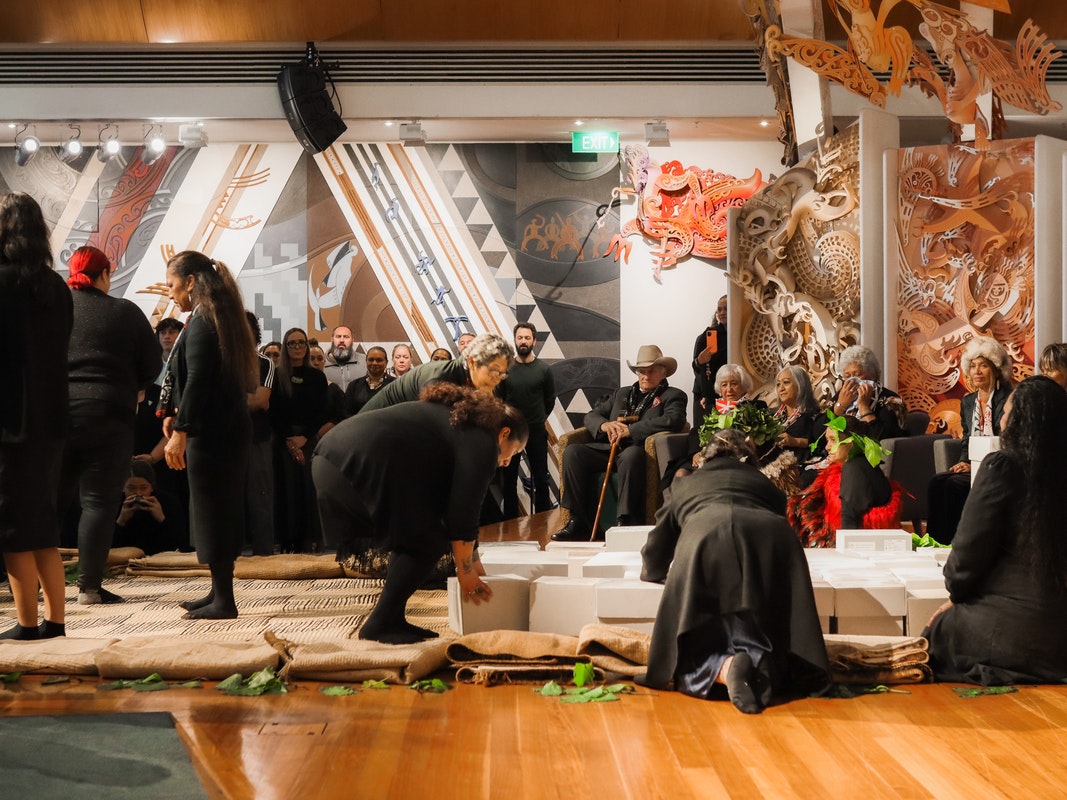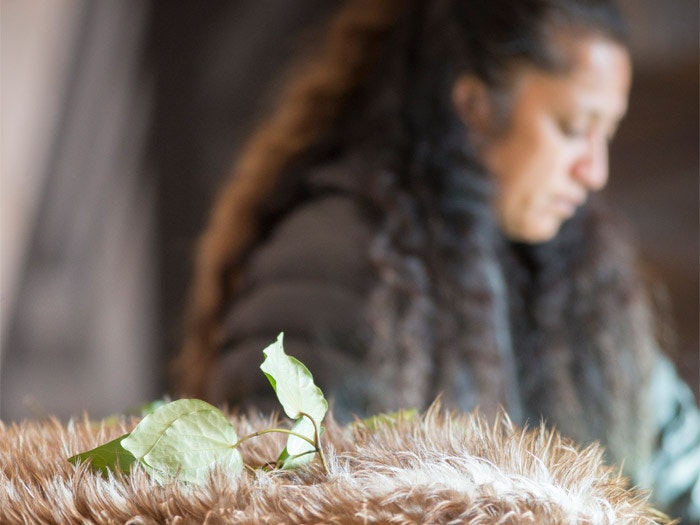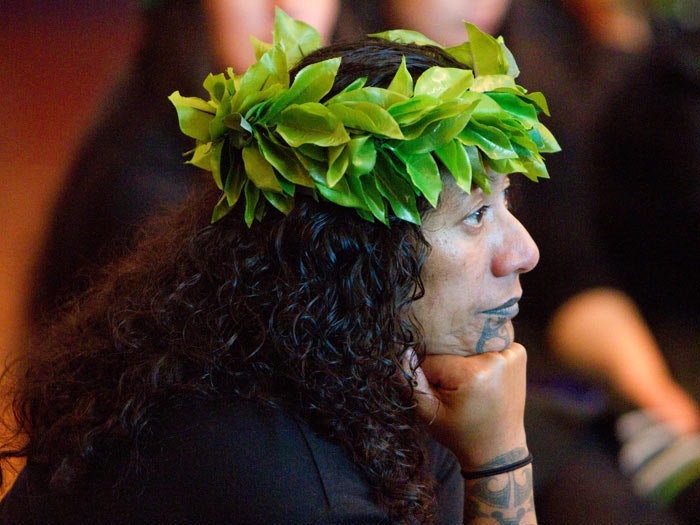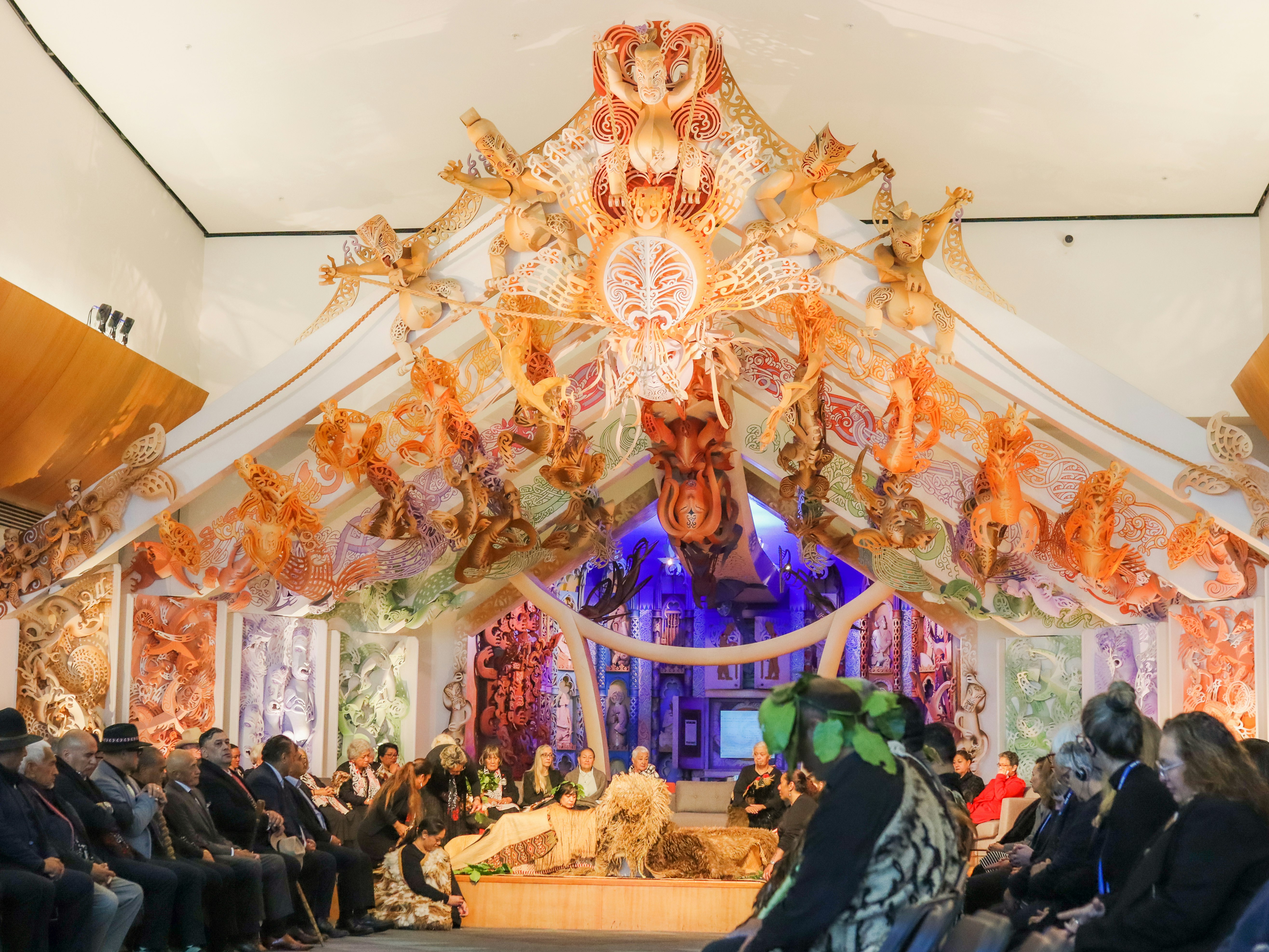
Seeking the domestic return of kōiwi tangata and kōimi tchakat from Te Papa
Find information on the process of returning kōiwi tangata, kōimi tchakat and Toi moko to their whānau, hapū, iwi/imi or rohe/takiwā.
Free museum entry for New Zealanders and people living in New Zealand
Open every day 10am-6pm
(except Christmas Day)
Free museum entry for New Zealanders and people living in New Zealand
Karanga Aotearoa is the government mandated authority that negotiates the repatriation of Māori and Moriori ancestral remains on behalf of Māori and Moriori.
The team comprises of a repatriation manager, repatriation researcher, and repatriation coordinator.
They work with the support and expert advice of the Repatriation Advisory Panel to locate, identify, negotiate and physically return kōiwi tangata and kōimi tangata/kōimi tchakat to Aotearoa New Zealand.
Read more about the team members
In May 2003, cabinet agreed that Te Papa should act on behalf of the government for the return of kōiwi/kōimi tangata.
This decision included the approval of operational funding for the repatriation programme. The funding covers research, repatriation travel, freight and crating, as well as associated expenses for international and domestic repatriations. It explicitly does not provide for the purchase of human remains.
The imperative for repatriation of human remains came from tangata whenua (Māori and Moriori) and has been developing for decades.
From the early 1970s, the late Maui Pomare dedicated much of his working life to international repatriation and the establishment of an appropriate wāhi tapu in the National Museum. In his capacity as the National Museum Chair he brought home the remains of 37 tūpuna.
In 1998, Te Papa held a wānanga on the care and management of kōiwi/kōimi tangata with iwi representatives. This was followed up with another hosted by the Ministry of Māori Development (Te Puni Kōkiri) in 1999. Outcomes from these wānanga stressed:
the importance of involving iwi Māori and Moriori in repatriation
the need for an organisation to lead the repatriation process and that Te Papa is the appropriate organisation
the requirement for iwi Māori and Moriori to develop their own management practices for kōiwi/kōimi tangata and to determine the final resting places for the kōiwi/kōimi tangata
the need for an interim repository for kōiwi/kōimi tangata
the need for the Government to play a facilitation and funding role in repatriation.
Since these wānanga, three more have been held, greatly increasing the awareness of the repatriation programme as well as providing for iwi to add to the growing body of knowledge on the subject.
Karanga Aotearoa will continue to facilitate local wānanga to assist with domestic returns and work towards solutions for the care of unprovenanced kōiwi/kōimi tangata.
Karanga Aotearoa works closely with iwi both during and after the negotiation process. If provenance is reliable, iwi are informed about the outcomes of negotiation and timing for the repatriation of their ancestors. Representatives from the descendant communities are invited to be part of the pōwhiri at Te Papa on their return to New Zealand.
Karanga Aotearoa staff carries out provenance research using a variety of archival sources, including accession information (though this is always interpreted cautiously), collector diaries and documents, auction house records, combined with traditional oral histories, waiata, pātere etc.
These records are merged in a process of research triangulation in an attempt to identify common strands and connecting points. For some kōiwi/kōimi tangata, this process is reasonably straightforward, particularly if reliable records exist about the circumstances of acquisition.
The Karanga Aotearoa Repatriation programme invites institutions to repatriate kōiwi/kōimi tangata and Toi moko held in their institutions.
Once an institution indicates they are willing to take the conversation further, the programme keeps in regular contact and then submits a repatriation case for the governing body to consider.
In some situations a repatriation agreement with an institution can take less than 12 months, however, in most circumstances, a longer period is required.
Toi moko and kōiwi/kōimi tangata are returned from overseas institutions to Te Papa on an interim basis only. Neither Toi moko nor skeletal remains are accessioned as part of Te Papa’s collections and Te Papa has a policy prohibiting their exhibition. Rather, kōiwi/kōimi tangata remain in Te Papa’s dutiful custody pending return to their attributed place of origin.
The single goal of repatriation is not to hold the remains at Te Papa indefinitely but to return them to their communities.
Māori and Moriori believe that through this ultimate return to their domestic homelands, the dead and their living descendants will retrieve their dignity.
Te Papa receives repatriation agreements on a regular basis and is increasingly approached by international institutions offering to return kōiwi/kōimi tangata.
Karanga Aotearoa staff have found that the process of contact and negotiation with international institutions has brokered a range of other curatorial museum opportunities.
Repatriation contact has often opened the door to exchange programmes, sharing of curatorial knowledge, and opportunities for hosting repatriation interns and knowledge experts.
Since 1 July 2003 until 1 May 2024, Te Papa has repatriated 850 Māori and Moriori ancestral remains from overseas institutions, including from countries such as Australia, Austria, Canada, France, Germany, Sweden, the United Kingdom, the United States of America, and others. We estimate that there are over 450 still awaiting their homecoming.
See all detail of all the international repatriations
Returning kōiwi/kōimi tangata to their place of origin in New Zealand is the culmination of many months and sometimes many years of dedicated research and negotiations with iwi.
As part of the process of domestic repatriation, we provide each iwi with a research report containing provenance information such as the kōiwi/kōimi tangata’s museological and collection history, archaeological records and maps, and related mātauranga Māori. This document helps to inform iwi and their membership of their relationship to the returning kōiwi/kōimi tangata.
Domestic repatriations have been carried out in the North Island to Ngāti Kurī, Ngāi Tai, Te Tairāwhiti, Muaūpoko, Ngāti Apa, Ngāti Maniapoto, Whanganui, Tauranga Moana iwi (i.e. Ngāi Te Rangi, Ngāti Ranginui and Ngāti Pukenga), Ngāti Whakaue, Ngāti Te Ata, Ngāti Tūwharetoa, Kāwhia Iwi, Ngāti Kere/Ngāti Kahungunu and the iwi of Waimārama. In the South Island, they have been returned to Ngāi Tahu and Rangitāne o Wairau.
Since 1 July 2003, the Karanga Aotearoa Repatriation Programme has returned 76 ancestral remains to their papa kāinga. Further work is being done to return more tūpuna and karāpuna to their places of origin as more ancestors return from overseas.
All arrangements for domestic repatriations are led by iwi. Iwi determine the place, time, and details for the repatriation and burial or funerary rites involved. Some iwi have chosen to make their own burial containers and collect their ancestors from Te Papa. Others have asked Te Papa to escort the ancestors’ home to their marae. Te Papa’s role at this stage of the repatriation process is simply to be supportive of iwi wishes.

Find information on the process of returning kōiwi tangata, kōimi tchakat and Toi moko to their whānau, hapū, iwi/imi or rohe/takiwā.

Te Papa has returned close to 850 Māori and Moriori ancestors to Aotearoa New Zealand by repatriating ancestral remains, including Toi moko, from around the world.

Returning Māori and Moriori ancestral remains to iwi (tribes) Māori and imi Moriori across Aotearoa New Zealand and Rēkohu Chatham Islands.

Learn about the people behind the Karanga Aotearoa repatriation programme.